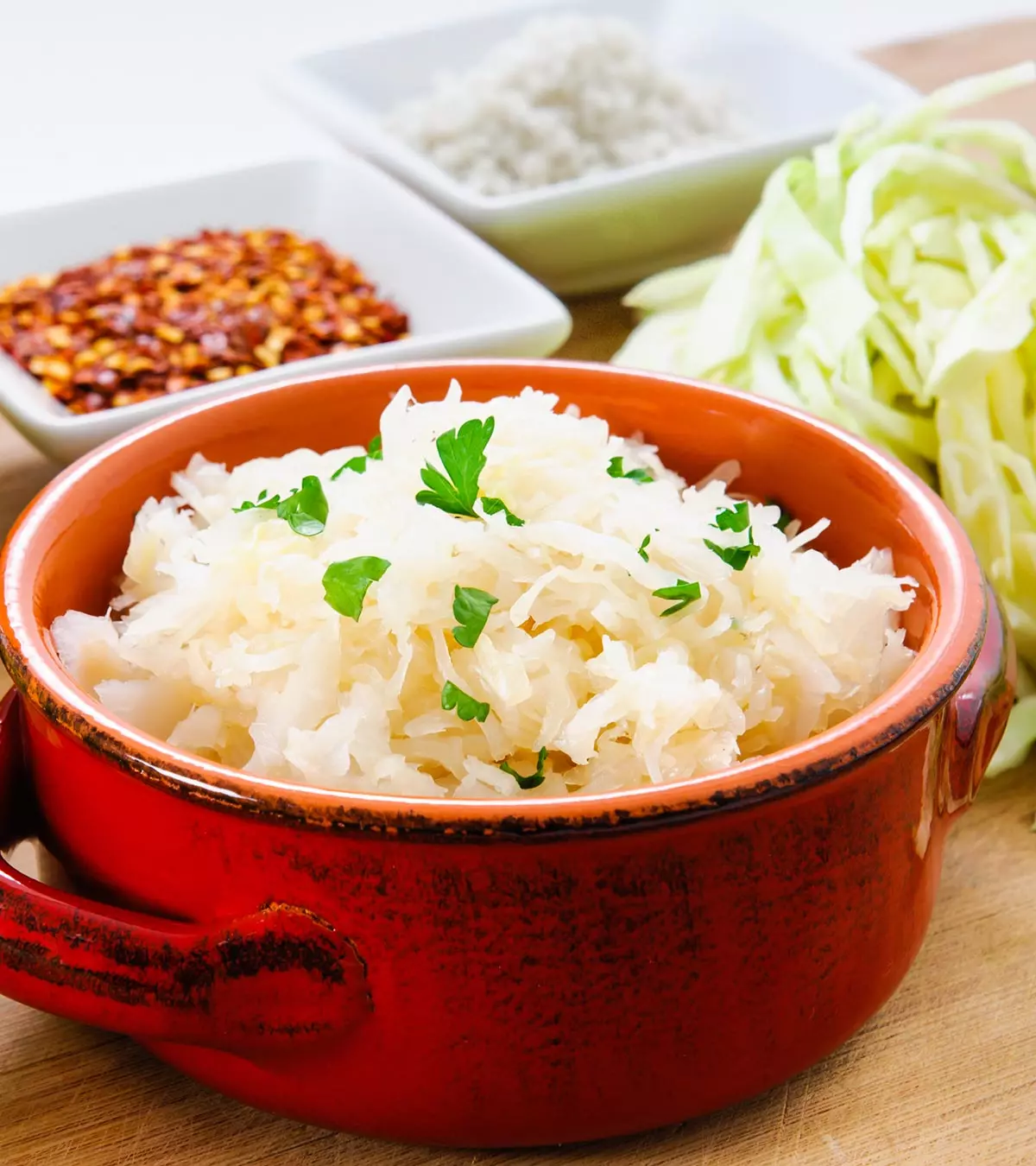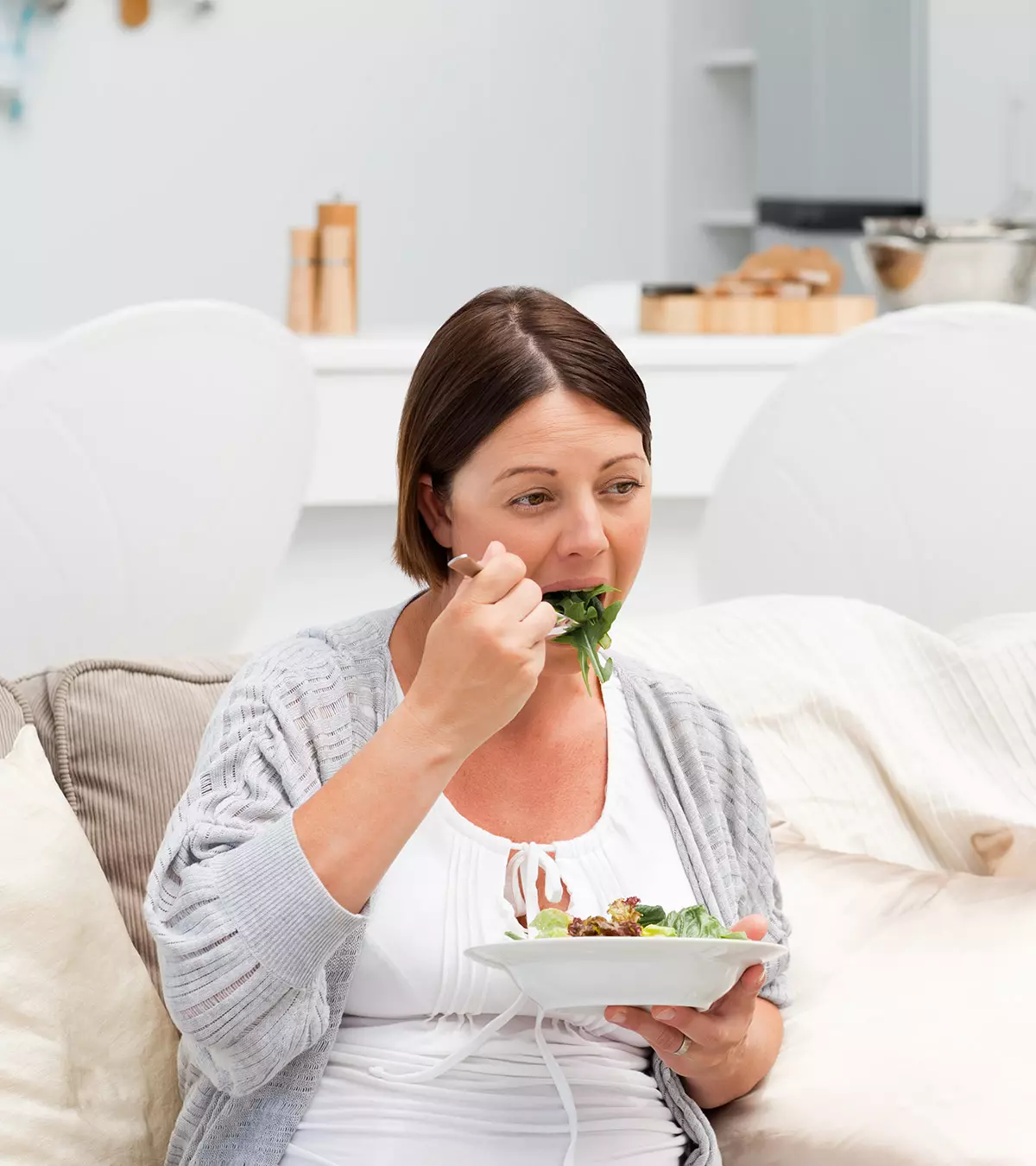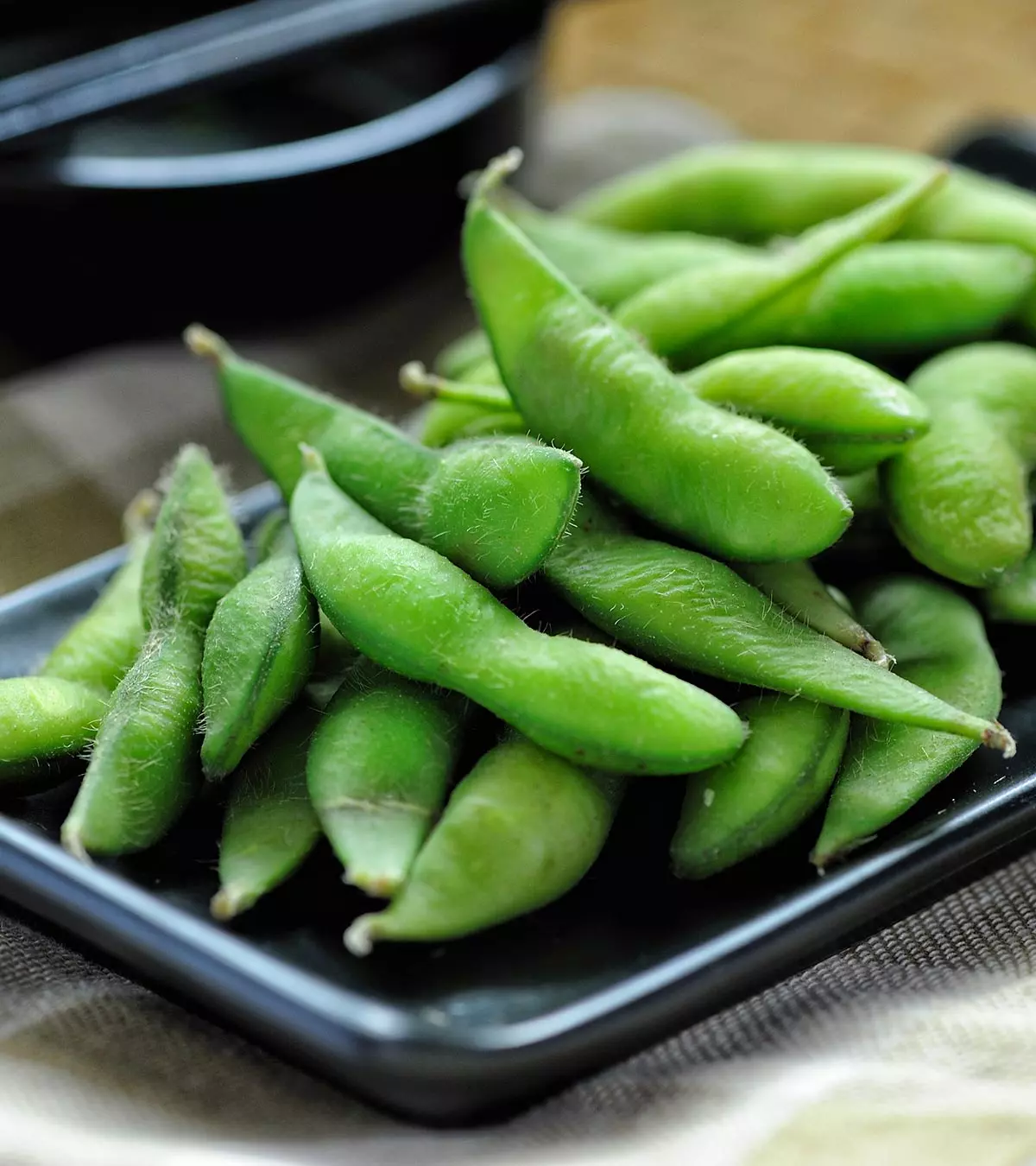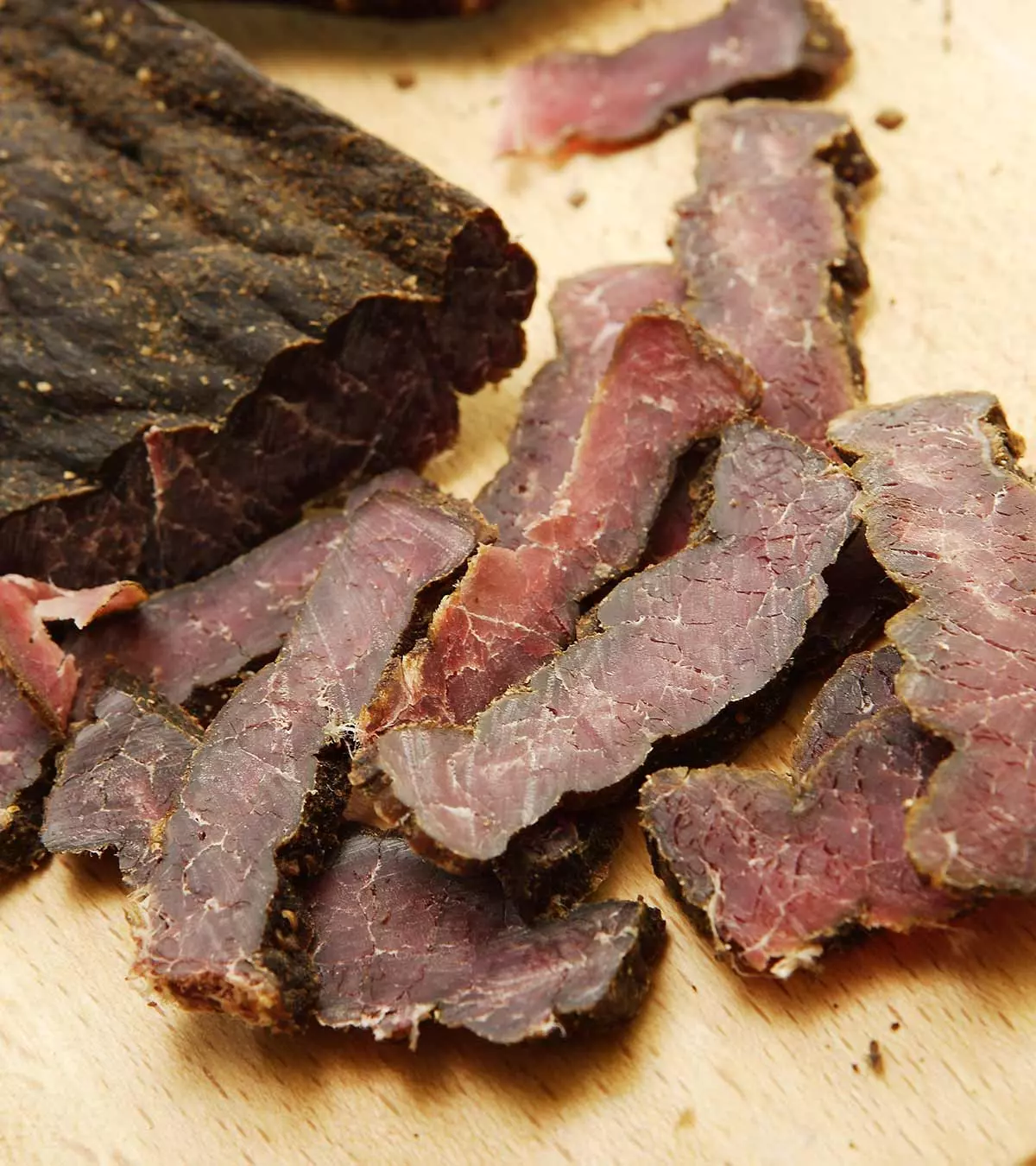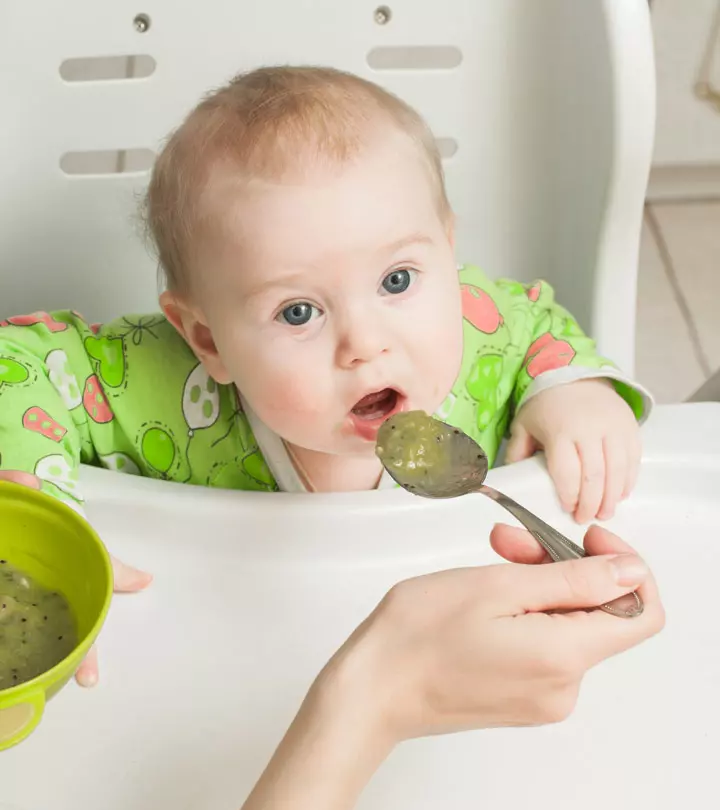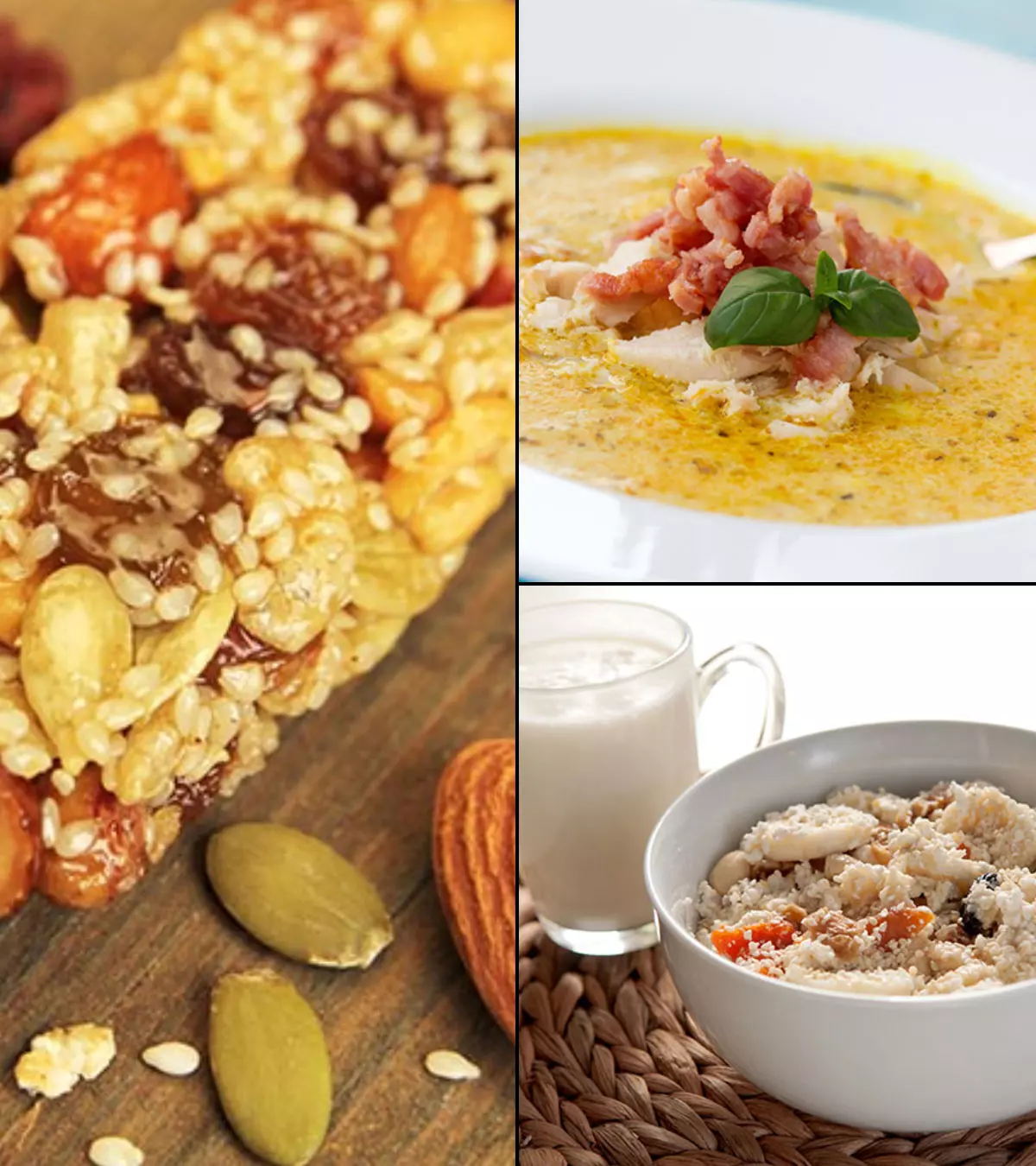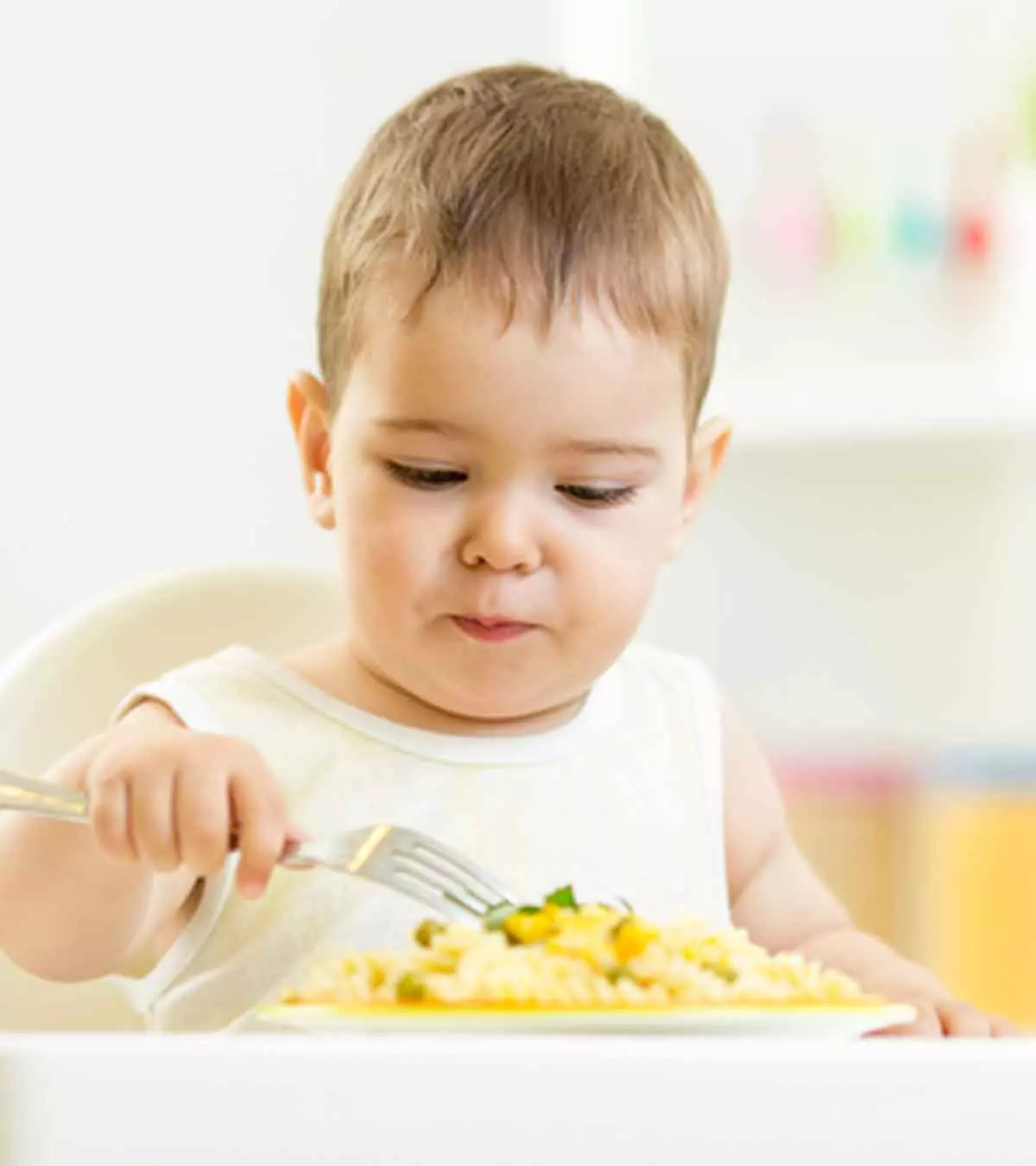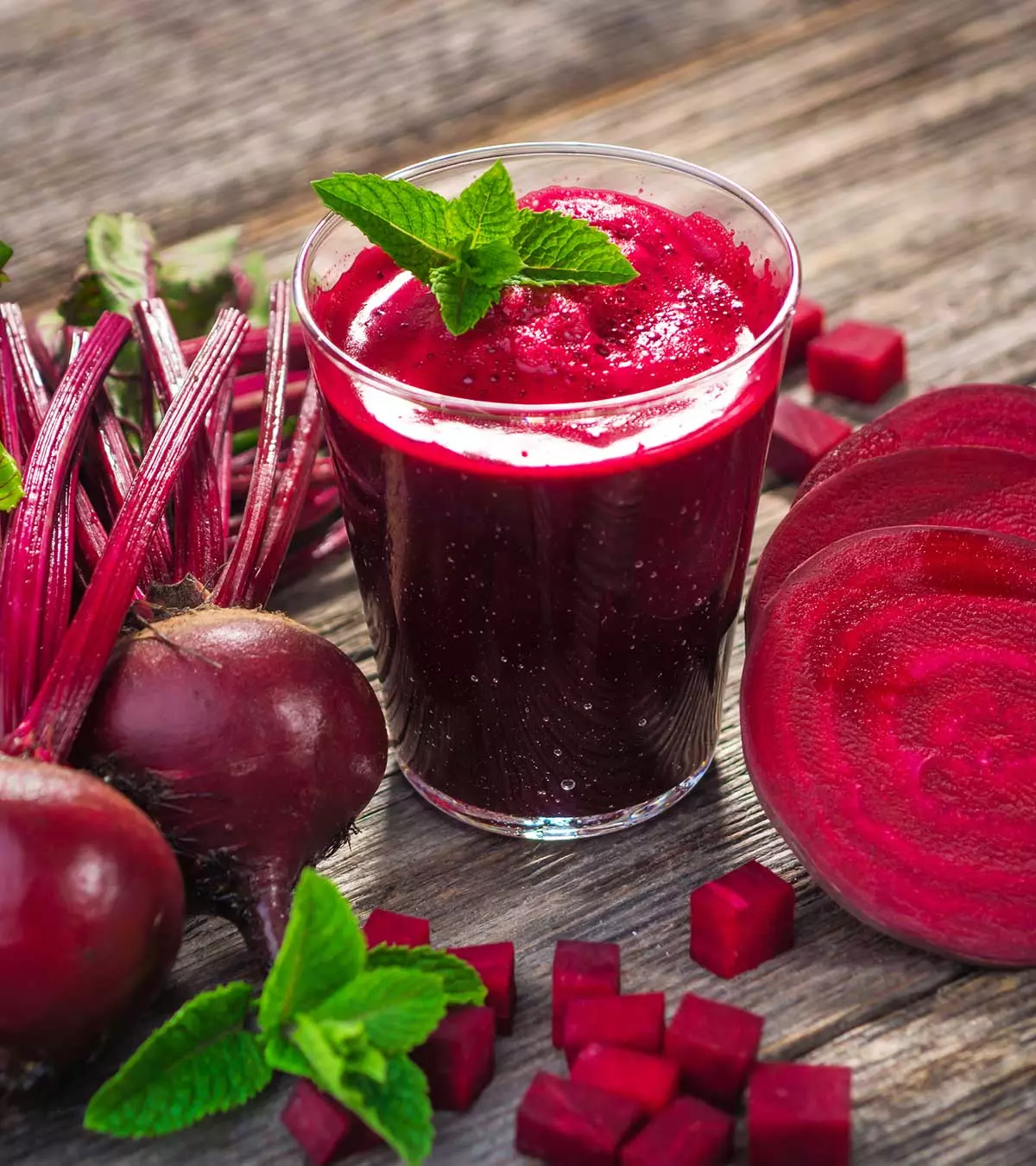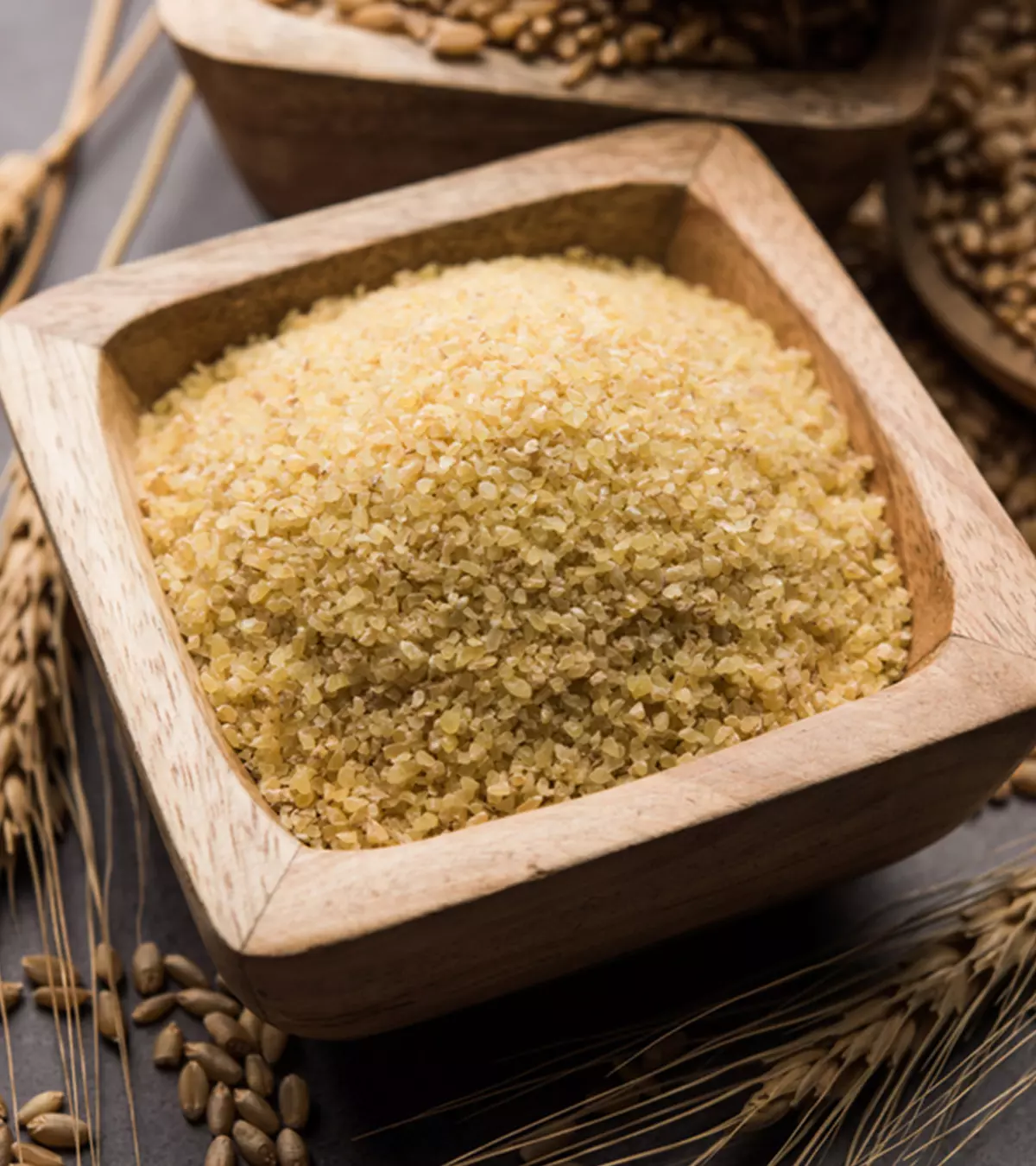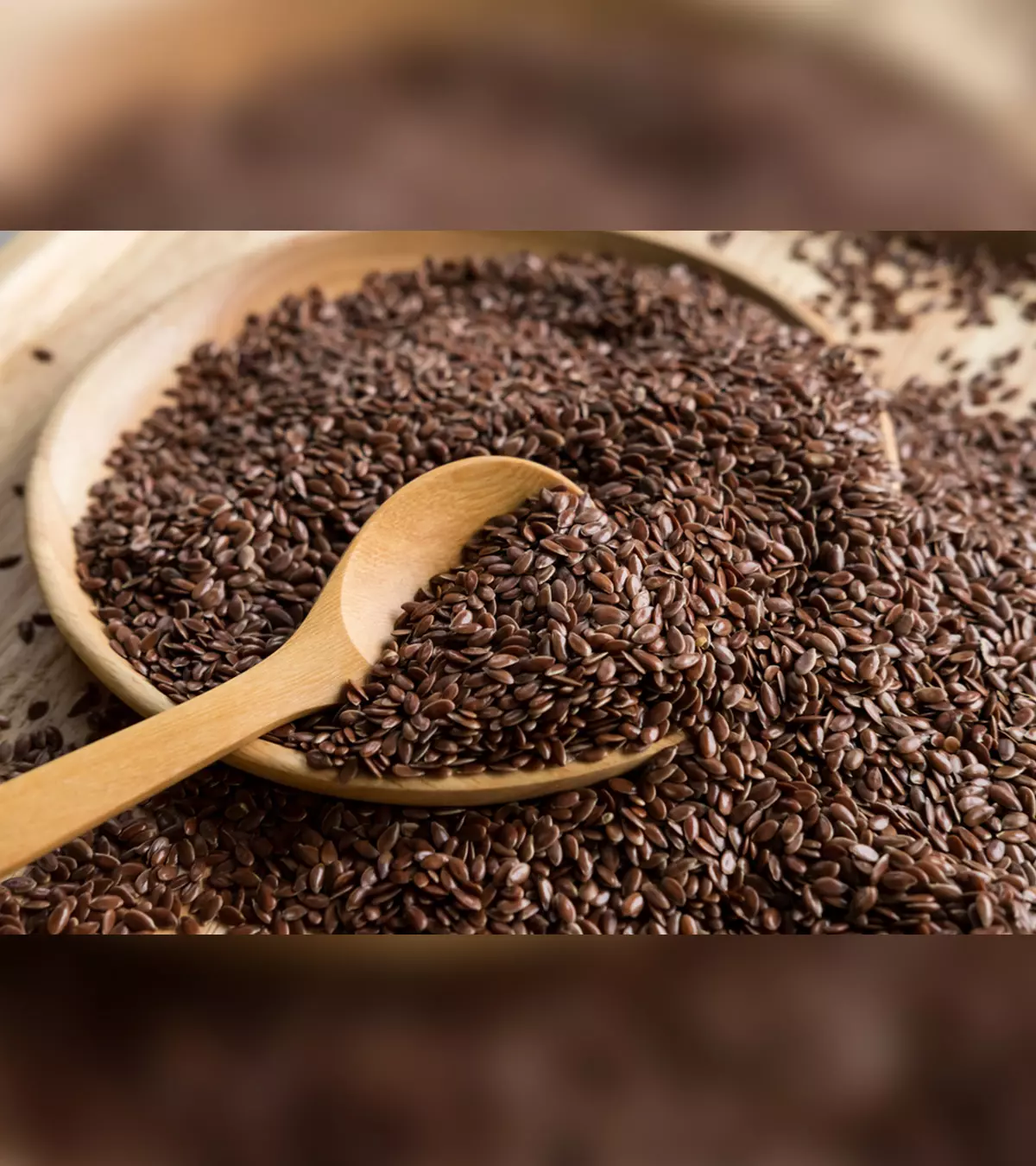
Image: ShutterStock
Parents may be doubtful about whether or not to use flaxseeds for babies. Flaxseeds or linseeds are a natural source of ALA (alpha-linolenic acid), an essential fatty acid. The seeds are also rich in dietary fiber and several beneficial compounds.

Flaxseeds may be used powdered, whole, or as cold-pressed oil. Regular consumption of flaxseed could provide several long-term health benefits. But are flaxseeds safe for babies? Read this post to know the use of flaxseeds for babies, its potential benefits, and precautions to consider while feeding flaxseeds to babies.
Key Pointers
- Babies can consume flaxseed flour (finely powdered flaxseeds) from the age of six months.
- These seeds are rich sources of fiber, essential vitamins, and minerals that aid in the overall development of your baby.
- You may begin by adding small quantities of flaxseed powder to your baby’s food to check if it suits them well.
- Although flaxseeds seldom trigger allergies in babies, there could be mild side effects in some.
When Can Babies Have Flaxseeds?
According to the NHS, babies can consume finely powdered seeds from the age of six months (1)
. You can add powdered flaxseeds to puree, mash, porridge, and soup. You can also use flaxseeds to make different baby food preparations, such as flaxseed bread with guacamole.
Flaxseeds are usually well-tolerated by babies and rarely trigger any allergy in babies but might cause side effects in sensitive babies. Therefore consult a pediatrician or pediatric nutritionist before feeding any form of flaxseeds to your baby.
Nutritional Value Of Flaxseeds
Flaxseed is nothing less than a superfood that has abundant dietary fiber, omega-3 fatty acids, vitamins K, C, B complex, minerals, and other health-promoting plant compounds. One teaspoon (2.5g) of ground flaxseeds can add the following nutrients to your baby’s diet (2) (3) (4).
| Nutrients | Amount | AI(7-12 months) |
|---|---|---|
| Energy | 13.4Kcal | – |
| Protein | 0.457g | – |
| Total lipid (fat) | 1.05g | – |
| Carbohydrate, by the difference | 0.722g | – |
| Fiber, total dietary | 0.683g | – |
| Calcium, Ca | 6.38mg | 260mg |
| Magnesium, Mg | 9.8mg | 75mg |
| Phosphorus, P | 16mg | 275mg |
| Potassium, K | 20.3mg | 860mg |
| Folate, total | 2.18µg | 80µg |
AI = Adequate intake – nutrient level assumed to ensure nutritional adequacy.Sources: U.S. Department of Agriculture and Oregon State University
Besides these, these plant-based sources of nutrition contain certain bioactive compounds, such as lignansiChemical compounds found in plant foods such as nuts, vegetables, tea, and coffee, possessing anti-inflammatory properties , which promote long-term health on regular consumption (5).
Possible Health Benefits Of Flaxseeds For Babies
Flaxseeds served as a part of a balanced diet could provide the following benefits to your baby.
- Provides several nutrients: A teaspoon of flaxseed powder a day can offer ample dietary fiber, minerals, and bioactive compounds that can contribute to your baby’s overall health.
- Aids brain development: Flaxseeds provide high amounts of ALA, an omega-3 fatty acid from which the body synthesizes DHA (docosahexaenoic acid) (6). DHA is a vital element for the healthy brain development of your baby and toddler (7).
 Quick fact
Quick fact- Maintains healthy bowel: Flaxseeds contain both soluble and insoluble fibers. The insoluble fiber absorbs the water and increases the bulk. It helps maintain a healthy bowel, keeping constipation at bay (5). In this regard, coarsely ground flax seed works more efficiently than finely ground flaxseed.
- Boosts gut microbiota: The human gut contains healthy microorganisms known as probiotics that ferment compounds called prebiotics to produce substances that promote health (8). Flaxseed fiber and polysaccharidesiNatural carbohydrates that provide energy act as prebiotics, enhancing the probiotics (9). A healthy gut is necessary for a robust immune system.
Besides these benefits, flaxseeds provide compounds such as lignans, phenolic acids, and antioxidantiMolecules that prevent cell damage caused by free radicals and anti-inflammatory compounds found in plants and fruits” ] (10). These compounds possess antioxidant properties that can support overall health in the long-term.
Tips To Select And Store Flaxseeds
Below are some tips that can help you select and store flaxseeds appropriately.
- Flaxseeds come in golden yellow and brownish colors. You can select either to feed your baby as both are nutritionally similar (11). Usually, brown flaxseeds are more commonly used due to their better taste and appearance.
- Avoid raw and unripe flaxseeds as they may contain potentially toxic compounds that can be harmful in large doses (12).
- Buy packaged whole flaxseeds from a reputable and trustworthy brand. It is necessary to ensure the product’s safety.
- Purchase ground flaxseeds sold in refrigerated vacuum packs. Ground flaxseeds are more susceptible to oxidation, which makes the product rancid. Alternatively, you can buy whole flaxseeds and ground them at home.
- Check the date of packaging and date of expiry when buying whole or ground flaxseeds. Every credible manufacturer mentions these details on the packaging.
- Keep the flaxseeds in their original packaging until you use them. Transfer the flaxseeds in an opaque, airtight container for extended shelflife.
- Store flaxseeds’ container in the refrigerator, away from heat and moisture. Ground flaxseeds stored in such a manner can stay edible for up to six months. You can freeze whole flaxseeds in the freezer for up to a year or two.
Precautions To Take While Using Flaxseeds For Babies
Observing precautions ensures the safe ingestion of flaxseeds in babies.
- Do not give whole flaxseeds to your baby. Instead, provide ground flaxseeds added to different baby foods. Whole flaxseeds mostly pass undigested from the gut, making it nearly impossible for the baby to reap their benefits (13).
- Check the freshness of whole or ground flaxseeds before adding them to the food. If the seed or powder smells or tastes rancid, discard it.
- Start with small amounts, such as one-fourth teaspoon of ground flaxseeds, and add it to a food item that the baby is already eating comfortably.
- If the baby shows signs and symptoms of intolerance or sensitivity, discontinue feeding and try later. In case the signs and symptoms persist or worsen, consult a pediatrician and do not feed flax seed until the doctor approves it.
- Gradually increase the amount to a teaspoon or two depending on the baby’s digestibility. You can also use flaxseed oil, but do not heat it as heat eliminates its nutritional properties.
 Point to consider
Point to consider- Ensure the baby consumes plenty of fluids or water along with ground flaxseed to prevent digestive problems, such as gas and flatulence, which may occur in sensitive babies.
- Flaxseed allergy isn’t common but possible, especially in babies with a family history of flax allergy. Discontinue feeding flaxseed in any form to your baby if you notice signs of an allergic reaction, such as itching, swelling, wheezing, red rashes (hives), nausea, vomiting, and diarrhea.
- Drug interaction is a possibility with flaxseed ingestion. If your baby is on any medication, consult a pediatrician before serving flaxseeds in any form. Flaxseed ingestion is not advisable if the baby has gastrointestinal strictureiNarrowing of intestines due to repeated inflammation or inflammation (12).
Recipes To Include Flaxseeds In Babies’ Diet
Now that you know about flaxseeds, let’s learn how to use flaxseed in baby food.
1. Fruity yogurt with ground flaxseeds (6+ months)
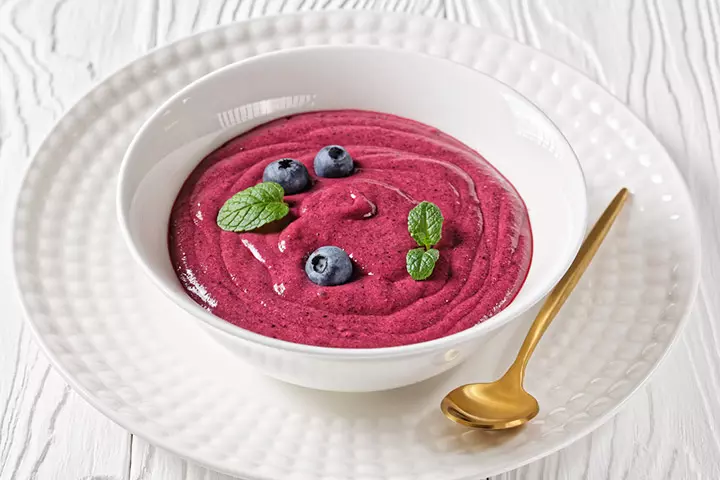
You will need:
- 1cup unsweetened Greek yogurt
- ½ cup frozen blueberries (chopped)
- ½ cup ripe mango (chopped)
- 1 ripe banana (mashed)
- 1tsp ground flaxseeds
How to prepare:
- Blend all the ingredients into a smooth-flowing, lump-free fluid.
- Pour the fluid into a feeding bowl and feed immediately.
- You can add dry fruit powder, a pinch of cinnamon, nutmeg, and a teaspoon of jaggery powder to scale up the recipe’s nutritional profile.
2. Flax oatmeal porridge (8+ months)
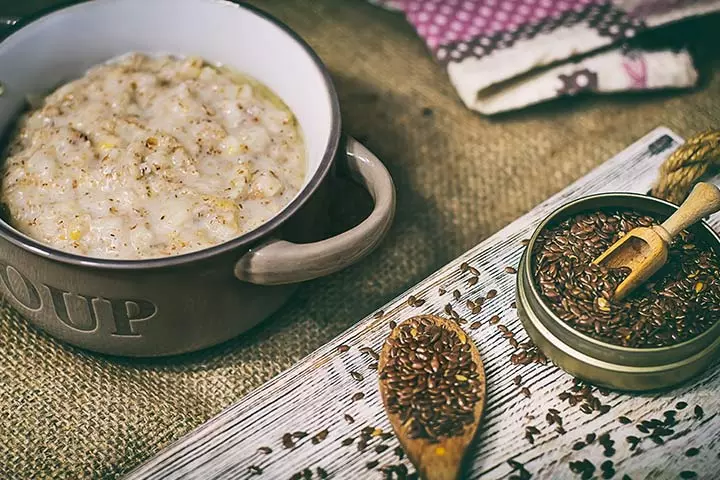
You will need:
- 1 cup water
- ½ cup instant oats
- 1tsp jaggery powder
- 1tsp ground flaxseeds
- ½tsp dry fruit powder
How to prepare:
- Heat water in a saucepan. As the water begins bubbling, add oats and ground flaxseeds. Cook until the oats are adequately cooked.
- Add jaggery powder and dry fruit powder and mix well. Turn off the heat and set the saucepan aside.
- Transfer some porridge to a feeding bowl and let your baby self-feed.
 Quick tip
Quick tip3. Flax and carrot muffin (10+ months)
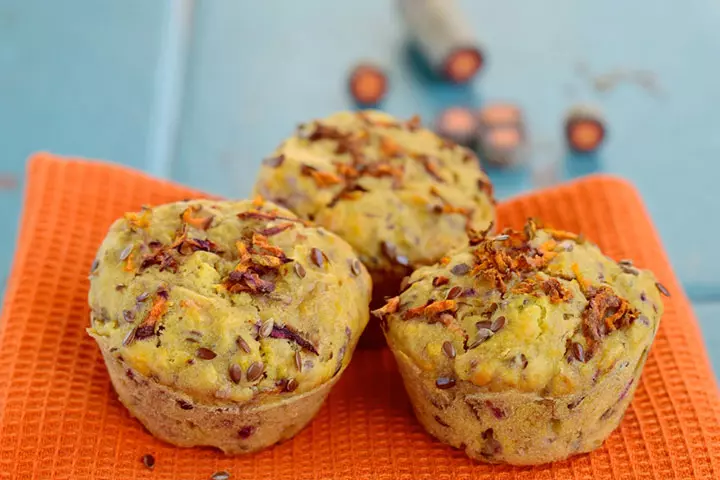
You will need:
- 2 cup carrot (grated)
- 2 cup apple (grated)
- 1 cup cranberries (dried)
- 1 cup whole wheat flour
- ¾ cup ground flaxseeds
- ¾ cup rolled oats flour
- ¾ cup whole milk
- ½ cup brown sugar
- 2tsp cinnamon powder
- 2tsp baking soda
- 1tsp unsalted butter
- 1tsp baking powder
- 1tsp vanilla bean paste
- 2 eggs
How to prepare:
- Preheat the oven at 350°F (176°C). Grease a muffin tray with butter and set aside.
- Meanwhile, grind oats to make oat flour and grate carrots and apples.
- Mix all the ingredients, except milk, eggs, and vanilla bean paste in a mixing bowl.
- In a separate bowl, whisk eggs and mix with milk and vanilla bean paste. Add this mixture to the previous bowl, mixing them thoroughly to prevent any lumps.
- Pour the batter into the muffin tray and bake for ten to 15 minutes.
- Once done, transfer the muffins to a plate and serve one to your baby for self-feeding.
4. Flaxseed bread (12+ months)

You will need:
- 1 cup wholewheat flour
- 1 cup rolled oats
- 1 cup raisins (chopped)
- 1 cup whole milk
- 1 cup boiling water
- ⅓ cup jaggery powder
- ¾ cup flaxseeds
- 1tsp baking soda
- 1tsp baking powder
- ¼tsp salt
How to prepare:
- Preheat the oven to 350°F (176°C). Lightly grease a loaf pan and set aside.
- Put raisins in a large bowl and pour boiling water over them. Add baking soda, mix well, and let stand for five minutes.
- Add flaxseeds, flour, rolled oats, jaggery powder, baking powder, salt, and milk. Stir well until everything is mixed well.
- Pour the mixture of loaf batter into the loaf pan. Bake for about 60 to 75 minutes until the bread rises and develops a deep brown crust.
- Once done, keep the loaf pan on a wire rack to cool. Cut the loaf into thin slices and put one or two slices on the plate.
- Apply homemade spread and serve with a cup of plain yogurt.
5. Flaxseed pancake ( 7+ months)
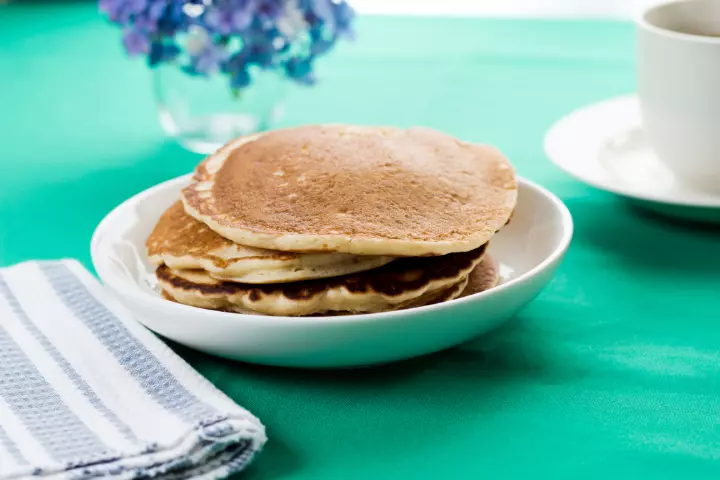
You will need:
- 4 ripe bananas
- 1/4 cup ground flaxseed
- 2 cups water
- 3 cups rolled oats
- 1/2tbsp cinnamon powder
How to:
- Preheat the pan to 350°F. Combine oats, ground flaxseed, and cinnamon in a high-speed blender and blend for a minute.
- Then add bananas and water and blend it until it gets thick to a slightly runny consistency. Let the batter sit for 15 minutes.
- Take ¼ cup of batter on the pan and fry it on each side for a few minutes. Serve the pancake warm.
6. Flaxseed smoothie (6+ months)
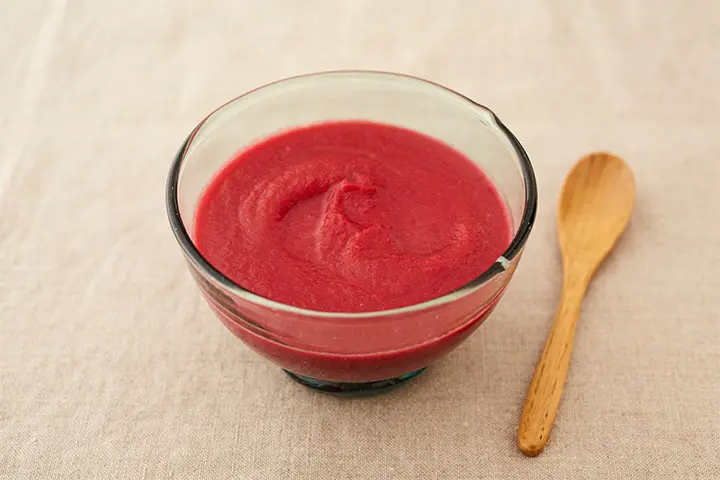
You will need:
- 1 cup almond milk
- 1/2 cup frozen strawberries
- 1/2 frozen banana (peeled and cut)
- 1tsp ground flaxseed
How to prepare:
- Blend all ingredients until smooth.
- Check if there are no tiny bits or pieces of flaxseed. Blend again if needed.
- Serve immediately.
Frequently Asked Questions
1. Can flaxseed help with asthma in babies?
Studies show that omega-3 fatty acids are beneficial in childhood asthma as they reduce inflammation in the body (15). Flaxseeds are a good source of omega-3 fatty acids and may help reduce the intensity of asthma in some babies.
2. Are there any risks associated with giving flaxseed to babies?
Flaxseed is not known to cause serious side effects. However, taking in large amounts without drinking enough fluids may worsen constipation. The seeds may interfere with the absorption of certain medications. Consult a pediatrician before giving flaxseeds to babies on medications or having gastrointestinal problems and disorders (16).
3. Can flaxseed help with teething pain in babies?
No, flaxseed has no scientifically reported benefits for teething pain in babies.
4. Can flaxseed help with eczema in babies?
A study on experimental animals showed that fermented flaxseed oil had beneficial effects on atopic dermatitis (eczema) and alleviated symptoms such as epithelial damage, redness, swelling, and pruritus (17). However, there are no large studies on humans establishing the same.
Flaxseeds for babies are a healthy source of infant nutrition and can be added to their meals. Due to their nutritional composition, flaxseeds are considered highly beneficial for health by aiding in the baby’s brain development, digestion, and immunity. Flaxseeds for kids are a great addition to their diet, offering similar benefits as they grow. If your baby is six months and older, you can feed them flaxseeds in powdered form by adding them to their meals while following the precautionary steps and looking out for any signs of sensitivity. You may also try out different flaxseed recipes for babies and feed a nutritious meal to your child.
Infographic: Tips To Include Flaxseed In Your Baby’s Diet
Flaxseed can be a nutritious addition to your baby’s diet if you follow the right precautionary measures. If your little one is six months or older and you want to introduce this seed for healthy development, here are a few tips to help you include flaxseeds in a baby’s diet.
Some thing wrong with infographic shortcode. please verify shortcode syntax
Illustration: Flaxseed For Babies: Safety Benefits And Side Effects

Image: Stable Diffusion/MomJunction Design Team
References
1. Complementary feeding (weaning) your baby; NHS
2. Seeds, flaxseed, FDC ID: 169414; Fooddata Central; USDA
3. Infant Nutrition and Feeding; USDA
4. Potassium; Oregon State University
5. Sunita Mishra and PoojaVerma; Flaxseed- Bioactive compounds and health significance; IOSR Journal Of Humanities And Social Science
6. Essential Fatty Acids; Oregon State University
7. Mihir Parikh et al.; Dietary Flaxseed as a Strategy for Improving Human Health; NCBI
8. Probiotics: What You Need To Know; NCCIH
9. Flaxseed fiber ferments in gut to improve health, reduce obesity; Science Daily
10. PriyankaKajla et al.; Flaxseed—a potential functional food source; NCBI
11. Ankit Goyal et al.; Flax and flaxseed oil: an ancient medicine & modern functional food; Journal of Food Science and Technology (2014)
12. Flaxseed; University of Rochester Medical Center Rochester
13. Are flax seeds good for me?; British Heart Foundation
14. Flaxseed: Little Seed, Big Benefits; Cleveland Clinic
15. Omega-3 Fatty Acids Tied to Fewer Childhood Asthma Symptoms; Johns Hopkins Medicine
16. Flaxseed; Brigham and Women’s Hospital
17. Joonhyoung Yang et al.; Therapeutic Effects of Fermented Flax Seed Oil on NC/Nga Mice with Atopic Dermatitis-Like Skin Lesions; NCBI
Community Experiences
Join the conversation and become a part of our nurturing community! Share your stories, experiences, and insights to connect with fellow parents.
Read full bio of Seeemaa Budhraja
Read full bio of Swati Patwal
Read full bio of Rohit Garoo
Read full bio of Ghazia Shah







